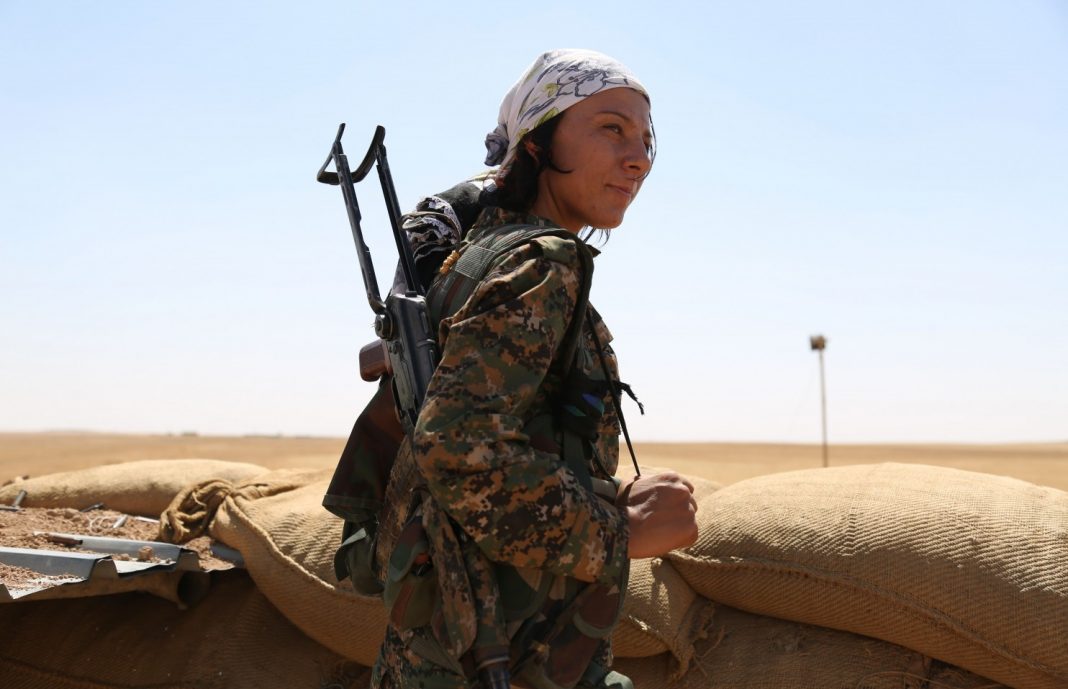The new coalition to destroy the Islamic State
David Ignatius/The Washington Post/May 23/16
The raw Sunni recruits in crisp camouflage uniforms, popping off rounds at the firing range at a U.S. training camp here, illustrate the dilemma for the United States as it seeks to form a strong military force to drive the Islamic State from its capital, Raqqah. The United States could try to build the Sunni army it would want, ideally, to capture Raqqah, a Sunni city. But that might take years. Or it can go with the army it has, which is dominated by the tough, experienced Kurdish fighters from the YPG militia. They’re anathema to Turkey, to the north, and to the official Syrian political opposition. But the rampaging Syrian Kurds get the job done.
The United States is trying to do some of both, by building a new opposition coalition under the makeshift banner of the “Syrian Democratic Forces,” or SDF, which integrates Sunnis, Christians, Turkmen and other inexperienced fighters with the larger, powerhouse that is the YPG. That’s not ideal politically but it makes military sense. “We do, absolutely, have to go with what we’ve got,” says Gen. Joseph Votel, the Centcom commander who oversees the war here, at the end of a long Saturday spent touring SDF bases. A small group of reporters was on the trip on condition that we couldn’t write about it until we had left the country. It was a rare chance to report from inside Syria.
The practical reality is that only the Kurds — not the Sunnis — have the muscle now, and Votel’s job is “to achieve military objectives on the ground” by continuing to roll back the Islamic State. This attempt to integrate the weaker Sunnis with stronger Kurds represents a more pragmatic alternative to the earlier $500 million “train and equip” program, which had been intended to create, in effect, a new Sunni-dominated army, but collapsed last summer.
Despite bitter objections from Turkey (which claims the Kurds are part of the “terrorist” PKK), U.S. commanders decided to go with the battle-hardened Kurdish fighters who had savaged the Islamic State in Kobani in 2014 and began to liberate a big swath of northeast Syria. Starting last October, they tried to graft less-experienced Sunni and Christian forces into the SDF coalition.
The Syrian Kurds are ferocious fighters, men and women alike. We met several leaders of the Kurdish women’s militia, called the YPJ. Wearing beaded headdresses over military camouflage, they said they had all fought in front-line combat. U.S. advisers say the Kurdish women are so tough they sometimes go into battle with suicide belts so they won’t be captured by Islamic State fighters who would turn them into sex slaves. American advisers tell awe-struck stories of YPJ warriors who fought to the last woman in Kobani. The equality of male-female sacrifice, proclaimed on billboards in Kurdish regions, is a breath of fresh air in a Middle East where women’s rights are suppressed.
Votel says the United States has learned from earlier Syrian missteps not to try to build a perfect force, but to work with the allies it has. When adding recruits to the SDF, he says, “we had to shorten the training period, and focus it more on combat basics,” adapting to the forces that existed rather than trying to remake them. Sunni sheikhs, always opportunistic, seem to be buying into the strategy as their best hope against the Islamic State. We met three such leaders who are sending their young tribesmen to fight with the Kurdish-led group.
The sheikhs described how some members of their tribes around Raqqah are beginning to defect from the Islamic State — and pleading for relief from the barbarous extremists. “We found that the YPG is the only force that can liberate us,” says Sheikh Mohammed al-Mila of the Tufaiha tribe. A similar view is expressed by Kino Gabriel, a local Syriac Christian leader whose small militia of 500 to 1,000 has allied with the Kurds. The alternative, he says, was “a lose-lose situation for all of us. None of us could defend the area by ourselves.”
Here, at least, the United States can’t be accused of trying to build Switzerland in the Middle East. It’s raw realpolitik, and sometimes the pieces don’t fit. Nujin Dirik, the commander of the Kurdish women’s militia, says she’s fighting for a place the Kurds call “Rojava,” which they hope will be an autonomous region someday. But Col. Ali Hajo, an SDF Arab commander from the northern town of Jarablus, says he’s fighting for a nation called Syria.




















